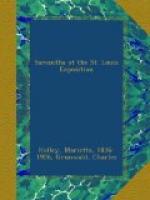And Josiah acted puggicky all the evenin’. But I knowed I wuz in the right on’t. Truly the path of duty is a thorny one anon or oftener.
We went into the Fair the next mornin’ by what they call the Skinker Entrance, and we hadn’t hardly got in when Josiah sez to me, pintin’ to a small low house, “What do you spoze they show there, Samantha? It must be pretty poor if they can’t afford shingles or a tar ruff.”
And sure enough the ruff wuz covered with straw. It wuz a low buildin’ built of sunthin’ that looked like stun. But come to find out it wuz the cottage of Robert Burns, and I hastened my steps, Josiah and Blandina follerin’ on.
For low as that buildin’ is, lookin’ like a ant hill almost by the side of the high red granite administration buildin’, that little cabin holds memories that soar up higher than the peakedest, highest ruffs on the Fair ground. The Home of Robert Burns, the Poet of the People. How his inimitable poetry come troopin’ through my mind as I walked through the low rooms, there is only four on ’em, kitchen, settin’ room, store room and stables.
I didn’t approve of havin’ the stables so nigh the livin’ rooms, and should have advised Robert’s wife to stood her ground and not had it. But I wuzn’t there, and she gin in probable, and mebby she wanted it so, it wuz handy, you could open the door and milk into your coffee cup if so inclined. The bed is built in the kitchen wall; I spoze they couldn’t afford anything better, and ’tennyrate that humble bed pillowed the form that will walk down the ages crowned with honor and lovin’ memories, while many monarchs who at that time rested on carved rose-wood have sunk into oblivion.
The people are not goin’ to forgit their poet. He who taught that no matter what the rank, a man wuz a man “for a’ that.” Who sung and dignified the humble pleasures of the poor. “The Cotter’s Saturday Night” will be remembered when many a scientific tome and eloquent poem writ in long words is dust and ashes. And the scathing irony and wit satirizing the ignorant rich, the scorn of meanness and bigotry, the love of liberty and justice the melting tenderness of his love poems, the People he loved and wrote for, will not forget.
The big open fireplace might have been the one immortalized in his poetry. There wuz a high clock like the one that told him the hours, anxious hours, weary hours, happy hours, hours radiant with the poet’s inspiration. Despairin’ hours full of anxiety and dread for the wife and children he loved. It told the hours of day and night too, for Robert did love what he called a good time, and I presoom Bonnie Jean read the face of that old clock with anxiety and weariness writ in her own face when the small hours struck and her Robbie wuz away with gay companions.
And with what despairin’ grief did she read its calm old face while her poet writ this sad truth:
“I’m wearin’ awa’ to the Land o’ the Leal.”




